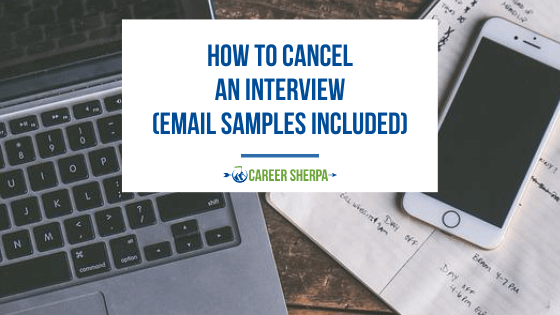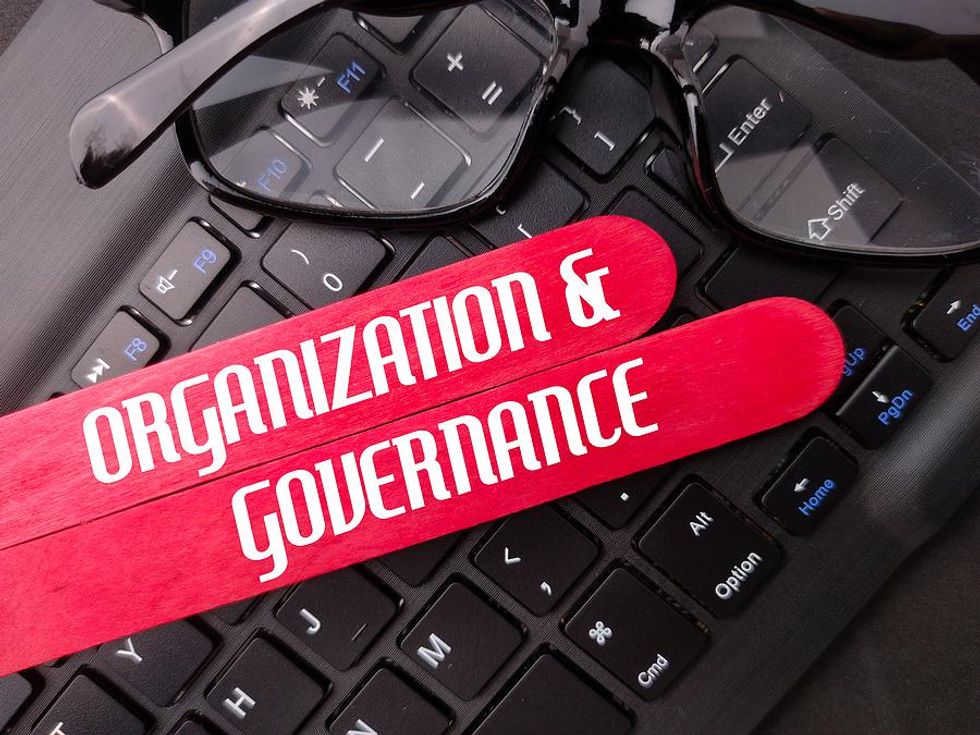Learning how to cancel an interview will likely come in handy at some point in your professional career. However, it s important to go about things the right way!

This guide will teach you how to cancel a job interview, and give you some great email samples to get you started.
Table of contents
Reasons to Cancel an Interview
When you’re taking the next steps in your career, you’ll likely have several opportunities to do job interviews. Interviewing is one of the more time-consuming aspects of the job hunt, and when you’re applying to several companies, it doesn’t take long for your schedule to fill up. Hiring managers and interviewers understand that.
Contrary to popular belief, canceling an interview is not the end of the world. Things come up, and there are many reasons why you might need to do this.
Maybe you’re experiencing a small personal crisis. For example:
- You, a child, or family member could get sick
- You experience Internet troubles that prevent you from doing video calls
- Your car has to go to the shop for sudden repairs
- Scheduling conflicts with your current job
In those cases, you may be able to reschedule your interview without too many hiccups in the hiring process (more on that later).
Alternatively, you might want to cancel your interview and end the process entirely because your plans have changed. Some common reasons to cancel include:
- Receiving a job offer from another company
- Deciding this position isn’t a good fit after doing research
- Choosing to go back to school
- Moving to a new city that makes commuting a challenge
Those are all valid reasons to cancel a job interview. What’s not reasonable, however, is canceling because you’re nervous or don’t feel you’ll get the job. You never know what good can come from giving it a shot.
Plus, it’s an excellent opportunity to get some interviewing experience, learn more about the company, and put yourself in front of people who could influence your career in the future.
How to Cancel an Interview
Canceling a job interview almost feels taboo to many job-seekers (just like declining an interview). While it is normal, there are right and wrong ways to go about it.
Here are a few valuable tips that will teach you how to cancel an interview in a way that won t burn bridges or negatively affect your reputation.
1. Be Sure You Really Want to Cancel
Before anything else, the most important thing to do is make sure that you truly have a good reason for canceling the job interview. Like we mentioned earlier, nervousness isn’t a good excuse to miss out on a job opportunity. While it s perfectly normal to feel nervous ahead of a job interview, you shouldn t let those feelings guide you in the wrong direction.
So before you start thinking about how to cancel an interview, but make sure that it s something you genuinely need to do. Think long and hard about your decision, and try to make other arrangements to make your original scheduled interview date if possible.
Remember: Interviews are about more than getting the job. It can also help you learn about the organization and gain experience. Even if you’re entirely sure this is a job you will take, it’s a good idea to go to the interview anyway.
If you’re still interested in the job, consider asking to reschedule. You don’t have to cancel entirely if this position is one that you want. Asking for a rescheduled interview date is much easier than canceling.
Only cancel if you’re 100 percent sure that it would be a waste of time for all parties involved.
2. Reach Out as Soon as You Can
The more advanced notice you provide, the better!
Many interviewers have no problem accepting a cancellation, but you must remember that they’re likely on a tight schedule, too. A single open position usually calls for several days of interviews with multiple people.
Waiting until the very last minute to say you can’t make it will only reflect poorly on you. The interviewer will feel like you wasted their time, which can affect you later.
Things happen unexpectedly, and you don’t always know that you must cancel until there’s not much time left. But whenever possible, try to reach out at least a full day in advance. If you can do it earlier, that’s even better.
3. Contact the Right Person
When it comes to figuring out how to cancel a job interview, another vital piece of the puzzle is getting in touch with the right person. You’ll meet several people during the hiring process, and not everyone knows about your interview plans.
Typically, the person you’d contact is the individual who scheduled your interview. That could be an HR professional, a job recruiter, or a manager.
If it’s your second or third interview, you might consider contacting the hiring manager directly if you’ve already spoken to them.
When you send an email to cancel the interview, include relevant information so that the person you’re contacting knows who you are. That means providing your full name, your scheduled interview date, the position you’re trying to get, etc.
4. Be Polite & Concise
Finally, be concise and remain professional.
Whether you want to reschedule or remove yourself from consideration, it’s never wise to burn bridges. Be polite and maintain professional decorum in your cancellation email.
Also, keep things short and sweet. While it is common to provide reasoning for your cancellation, there’s no need to go into details. A drawn-out email only wastes the interviewer’s time.
Be concise, apologize for the inconvenience, and thank them for their time. Keep it short and be polite to keep your professional reputation intact.
What to Avoid When Canceling an Interview
Now that you know the basics of how to cancel an interview, let’s discuss things to avoid. Remember, this can be a fairly delicate situation. While many hiring managers understand that things change and life happens, you still want to leave a good impression.
The goal is to get out of this job interview without being disrespectful or wasting anyone’s time. To do that, avoid these critical mistakes.
Providing Too Many Details
You don’t have to provide all your reasoning for canceling a job interview. It’s common courtesy to let the interviewer know why you can’t make it, but you don’t have to share anything you don’t want to. Saying it’s something as simple as a family emergency is all the interviewer needs to know.
Avoid going off on a tangent or making a million excuses. Remember: Polite and concise is the way to go.
Going into details is unnecessary, and it could even make you look bad in the end.
Being Too Restrictive
Are you looking to reschedule your interview? If so, most hiring managers are fine with that. However, it s a good idea to make it easy for them to fit you in.
The worst mistake you can make is being far too restrictive when rescheduling. Canceling the initial job interview can be inconvenient enough. Providing only a tiny window of opportunity to reschedule makes it even worse.
Be understanding and make things easy. That doesn’t mean you have to drop everything else, but you should do what you can to give the interviewer a reasonable list of dates and times that work for you.
Talking Rudely
Finally, don’t be rude. That should go without saying, but many assume that canceling automatically ruins your chances of ever working at that company. Because of that, their communication can become rude or unprofessional.
Canceling a job interview doesn t negatively impact your reputation unless you come off as rude and curt. Be courteous in all your communications. You never know what the future might hold. You may end up interviewing for the company later down the road.
Email Samples
Need some help canceling an interview by email? We have many examples to inspire you. While everyone’s situation is different, you can use these samples as a guide for composing an email that works for your situation.
Sample 1
In our first example, the applicant is canceling the job interview because they’ve decided to accept a position elsewhere. They have no plans to reschedule, but they provide notice professionally and courteously. This is an excellent example because it’s simple, straightforward, and doesn’t come off as rude.
“Dear Mrs. Johnson,
Thank you so much for considering me for the floor manager position at [COMPANY]. Unfortunately, I must withdraw from consideration and cancel my interview scheduled at your office on July 3rd at 2:00 PM.
I’ve accepted another opportunity and am no longer active in my job search. I appreciate the opportunity, and I apologize for any inconvenience.
Thank you for your consideration and time.
Sincerely,
[Name]
[Phone]
[LinkedIn URL]”
Sample 2
In this second example, the applicant has to cancel their existing interview. However, they want to reschedule and remain in the running. The email is to-the-point and still expresses interest in the opportunity.
“Dear Mr. Smith,
I’m reaching out to request a rescheduled date for our interview. Currently, we’re scheduled to discuss the manager position at your office on July 3rd at 2:00 PM. However, an unexpected obligation arose that I can’t move.
I’m still interested in this position, and I’m hoping that it’s possible to reschedule. My availability is as follows:
[Times and Dates]
Thank you for your consideration, and I hope to hear back from you soon.
Sincerely,
[Name]
[Phone]
[LinkedIn URL]”
Sample 3
In this final email example, the interviewer doesn’t want to provide many details about the cancellation. While it is somewhat vague, it’s a professional cancelation email that most hiring managers will respect. It’s simple, but effective.
“Dear Mrs. Brown,
Thank you for giving me the opportunity to interview for the leadership position at [COMPANY]. However, I must cancel our meeting on July 3rd at 2:00 PM. My circumstances have changed, and I’m no longer available for the position.
I apologize for any inconvenience caused, and I wish you the best of luck in finding a suitable candidate.
Best regards,
[Name]
[Phone]
[LinkedIn URL]”
Should You Cancel an Interview at the Last Minute?
Whether or not you should cancel at the last minute depends entirely on what you consider “last minute.”
Generally, it’s not considered professional to cancel on the day of the interview. Doing so can be a massive inconvenience and typically prevents hiring managers from rescheduling and using that time productively. As a result, it’s not uncommon for this to leave a bad impression.
In those cases, canceling at the last minute can hurt your chances of working at that company again (or at another company where the hiring manager moves to).
Like we mentioned earlier, best practices say you should always provide at least a full day of notice. The most important part of that rule is “at least.”
For some companies, even providing a full day of notice is considered “last minute.” You must remember that hiring managers will often interview several applicants multiple times. It’s a costly endeavor to hire a new person, and canceling even with a day of notice can throw things off and waste time.
Always reach out as soon as you can. The more time the hiring manager has to fill that gap your cancellation created, the better.
Things happen, and sometimes you have no choice but to cancel a job interview at the last minute. But those instances should be avoided at all costs. You want to maintain professionalism and ensure that this company doesn’t blacklist you from future opportunities.
Will Canceling an Interview Reflect Poorly on You?
Whether or not the cancellation reflects badly on you depends on how you do it!
Of course, waiting until the morning of the interview to reach out will make you look bad. The same goes for being super curt or rude in your email. It’s all in how you communicate.
If you come off as rude or inflexible, the hiring manager will not appreciate the fact that you wasted their time. They may toss your application entirely and make a note not to give you the time of day in the future.
But it’s usually not a big deal if you are apologetic and respectful. As we said earlier, things happen! You’re human, and hiring managers understand that this interview process comes with many unexpected turns.
Focus on being as kind, professional, and concise as you can. Avoid wasting anyone’s time, and be apologetic when you must cancel. If you do that, canceling an interview shouldn’t have too much of an impact on your professional reputation.
Conclusion
Now that you know how to cancel an interview, it s just a matter of following the steps!
Even if you re no longer interested in the job, this is still an opportunity to do things the right way and leave a good impression. Don t waste it.
The post How To Cancel An Interview (Email Samples Included) appeared first on Career Sherpa.













